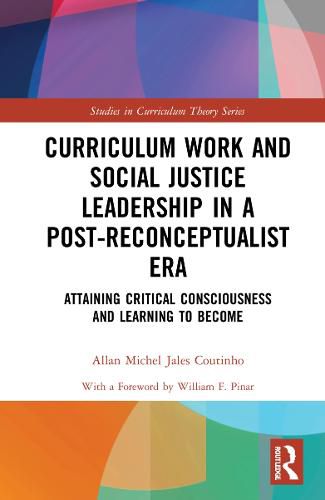Readings Newsletter
Become a Readings Member to make your shopping experience even easier.
Sign in or sign up for free!
You’re not far away from qualifying for FREE standard shipping within Australia
You’ve qualified for FREE standard shipping within Australia
The cart is loading…






This book urgently confronts systems of privilege and oppression within education, and combines concepts including bifocality, currere, and conscientizacao to highlight the role of dialogical and autobiographical reflection in dismantling neoliberal and colonial logics at the level of theory, policy, and practice.
The author purposefully connects methods and concepts from curriculum, social studies and the arts, and offers insights into identity formation, social position, and social transformation. As such, Jales Coutinho presents an opportunity for curricularists to evaluate the connections between their lives and their work within and across mutually-constitutive discursive and material contexts, and critically analyze their agency, their relational encounters, and their position as changemakers within unjust social realities. Focusing on the intersection of curriculum theory with educational policy and leadership, the text calls for a mutual becoming conscious to illustrate how this can affect a paradigmatic shift toward social justice education, lived curriculum, and emancipatory pedagogy.
With the potential to expand and set the tone for a long-standing curriculum conversation for curriculum theorists, educational leaders and policymakers concerning the contours and dimensions of our work in schools, research institutions, and policy circles, it crucially asks: what does it mean to engage in the complicated conversation of curriculum work in a post-reconceptualist era?
$9.00 standard shipping within Australia
FREE standard shipping within Australia for orders over $100.00
Express & International shipping calculated at checkout
This book urgently confronts systems of privilege and oppression within education, and combines concepts including bifocality, currere, and conscientizacao to highlight the role of dialogical and autobiographical reflection in dismantling neoliberal and colonial logics at the level of theory, policy, and practice.
The author purposefully connects methods and concepts from curriculum, social studies and the arts, and offers insights into identity formation, social position, and social transformation. As such, Jales Coutinho presents an opportunity for curricularists to evaluate the connections between their lives and their work within and across mutually-constitutive discursive and material contexts, and critically analyze their agency, their relational encounters, and their position as changemakers within unjust social realities. Focusing on the intersection of curriculum theory with educational policy and leadership, the text calls for a mutual becoming conscious to illustrate how this can affect a paradigmatic shift toward social justice education, lived curriculum, and emancipatory pedagogy.
With the potential to expand and set the tone for a long-standing curriculum conversation for curriculum theorists, educational leaders and policymakers concerning the contours and dimensions of our work in schools, research institutions, and policy circles, it crucially asks: what does it mean to engage in the complicated conversation of curriculum work in a post-reconceptualist era?